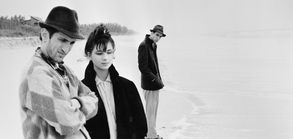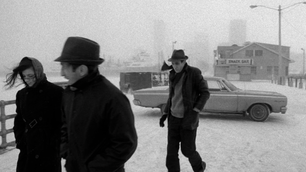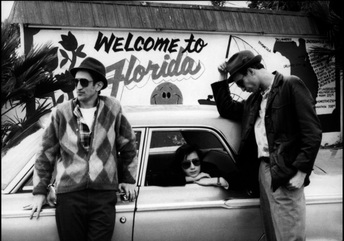
Welcome to my column, Colour Me (Dis)Interested (Ha! Isn't it clever?), where I will look at a black-and-white film a week that was filmed in the colour era. This week, I will be looking at Jim Jarmusch's 1984 film, Stranger than Paradise.

In a way it's an existentialist film without many very serious questions to deal with story or even character-wise (except until maybe the last fifteen minutes in the "Paradise" segment). Like a French New-Wave film, to which Jarmusch was heavily influenced by (for example, the gorgeous, grainy black and white photography by Tom DiCillo), he leaves more for the audience to ponder, as they go along on their journey.

In other words, those looking for a film where a lot of things 'happen' may be disappointed, or just bored. I've seen the film twice now, and on the first viewing I was a little detached from what was going on on screen, which is just little things going on with the characters, like one would see in everyday life. But on the second viewing I somehow connected more with these characters, the youth that seem to drift needlessly along. The editing of the film is also the most simplistic, though highly effective, in adding to the disconnected quality of Jarmusch's direction- no cuts during dialog, just fading to black, fading up, fading to black, fading up (Jarmusch would continue this with Down by Law and Dead Man, though not as frequent or strategic). The black and white images present a starkness and a clarity that heightens the alienation of self in a land that was supposed to be the new hope for immigrants from a decaying old world. Instead we see Eva walking through a deserted ghost world of New York where the graffiti says "Yankee go home". America is only a dream, a collective vision of a better world; paradise somewhere on earth.
In fact, the whole film is rather deliberate in its style, but as the song that plays several times in the film "I Put a Spell On You" from Screamin' Jay Hawkins plays, it does work to bring a viewer in...or not. Like many in the "art-film" world, almost all of Jarmusch's films are either liked or not, and I think that's appropriate for his stories, which often deal with low-key characters dealing with unusual but either realistic or metaphorical situations. One thing I can say for certain, much like the French new-wave films inspired by it, it's imitated, but not equaled in its form.

 RSS Feed
RSS Feed
